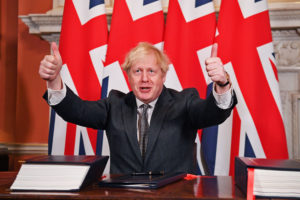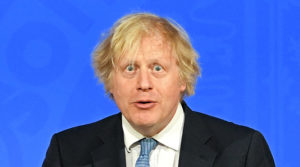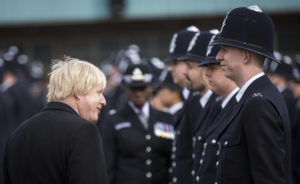With just over a week to go until the climax of the Conservative leadership contest, the name of the people’s favourite is surely not in doubt. After five ballots of MPs, weeks of campaigning and more than ten public hustings, the will of the members could not be clearer. The punters have weighed up the two candidates, examined their pasts, studied their principles and reflected on their promises. And faced with a choice between Rishi Sunak and Liz Truss, the finger of fate points to… Boris Johnson!
Such is the implication of a recent YouGov survey, which found that fully 49% of Tory members would choose as their leader the darling of the Greek tavernas, if only he were allowed to run – a higher proportion than those backing Sunak and Truss put together. And as The Times reported earlier this week, this was echoed in findings of focus groups among swing voters, who seem exceptionally unenthusiastic about either of Johnson’s potential successors.
Again and again, in fact, the same theme appears: Boris was robbed. “I really liked Boris and I was really, really disappointed in the way he was treated,” said one swing voter in Esher and Walton, speaking for the rest. “They’re picking on minor things. You know, furnishings and wallpaper and making such a big deal about it. And it’s the media. The media are the ones that turn everyone against him.”
Was Boris robbed, though? You didn’t often hear that line in June and July, when he narrowly survived a no-confidence vote, led his party to crushing defeats in the Wakefield and Tiverton and Honiton by-elections and was forced to watch the collapse of his government as some 31 ministers from all sides of the party, equating to just over a quarter of his entire administration, resigned in protest. On 7 July, the day he finally threw in the towel, YouGov found that his public favourability had sunk to truly diabolical levels, with just 19% having a positive view, and fully 72% a negative one. That made Johnson even more unpopular than Theresa May just before she quit, and almost as unpopular as Jeremy Corbyn at his nadir. So much, then, for the populist hero of the Red Wall masses.
And yet, as extraordinary as it may sound, the Big Dog’s fightback began that very afternoon. The opening shots came as he stood outside 10 Downing Street, reminding the cameras of his “incredible mandate: the biggest Conservative majority since 1987, the biggest share of the vote since 1979”. Then came Johnson’s insistence that it was “eccentric to change governments when we are delivering so much”, and his dismissal of the Westminster “herd” that had moved against him. And then, in his final Prime Minister’s Questions appearance a fortnight later, came those ominous words “Mission accomplished, for now”, as well as that classic Johnsonian sign-off: “Hasta la vista, baby.” The only surprise is that he didn’t use another Terminator payoff: “I’ll be back.”
Ever since, the idea that Boris was robbed, cheated, stabbed in the back has been gathering force. The Tory tabloids insist that he was the victim of a “putsch”, while his adoring Culture Secretary, the ridiculous Nadine Dorries, maintains that he was removed by a “ruthless coup” led largely by Sunak. And among Tory activists, the idea that he was toppled by a sinister media campaign has almost visibly gathered strength — enthusiastically fed, it has to be said, by Liz Truss. When, at one Tory hustings earlier this month, the former Sun political editor Tom Newton Dunn asked if Johnson had been the author of his own downfall, an activist shouted that it was “the media”. “Sounds like you’re being blamed, Tom,” said Truss with a smirk, “and who am I to disagree with this excellent audience?”
Not all stab-in-the-back myths are entirely baseless. Richard Nixon always maintained that the media had it in for him during Watergate, and he wasn’t entirely wrong. That said, it wasn’t the Washington Post that bugged the Watergate building, paid off the burglars and tried to cover it up. It was Nixon himself. And in any case, so what if some of the newspapers have it in for you? Some British media organisations are always hostile to any Prime Minister, because our papers are so unashamedly partisan. Sure, it’s true that Matthew Parris and Max Hastings and everybody at the Guardian loathed Boris from Day One and were never going to give him the slightest credit. But again: so what? Just think of how bitterly much of the media hated Margaret Thatcher in the Eighties; or how viscerally the Tory press loathed Harold Wilson in the Seventies. And in any case, Johnson could always rely on the Express, and the Mail, and the Sun …
Of course political parties are no strangers to conspiracy theories. (Hello to our friends in the Labour Party! And hello to readers from across the Atlantic!) In fact, I’ve always thought that there’s a fine line between the ideological political activist, whether on the Left or Right, and the card-carrying conspiracy theorist: the same emphasis on heroes and villains; the same elaborate but ultimately simplistic explanation for everything that’s gone wrong; the same obsessions with truth and lies, shadowy plotters and hidden hands. Perhaps, inside every really keen political partisan, there’s a conspiracy theorist struggling to get out.
But the great problem with many conspiracy theories is that you have to believe an awful lot of mutually antagonistic people were prepared to plot together in a way that just doesn’t happen in real life. Oliver Stone’s JFK assassination theory, for example, involves so many different conspirators — the CIA, the FBI, the Mafia, the Secret Service, the military-industrial complex and even Kennedy’s own vice president — that it’s hard to believe they would ever have found a room big enough to hold their evil planning meetings.
And is the Boris Johnson assassination plot so different? A common refrain on the Right, for example, is that he was toppled by what top GB News brainbox Dan Wootton calls “the MSM, establishment and remoaner blob”. But just look at the list of supposed putschists, the people who came out against Johnson before the end. What kind of establishment blob boasts Dominic Cummings as one of its chief masterminds? Was David Davis (“In the name of God, go!”) part of this Remoaner conspiracy? The same DD who campaigned for Brexit? Was Steve Baker another member? Self-styled “Brexit hardman Steve Baker”, ex-chairman of the European Research Group? Really?
What about the journalist who called Johnson “a man who not only cannot tell the truth, but who doesn’t care that he can’t because he feels such contempt for colleagues and the public that it doesn’t matter”? Never, the writer added, had the premiership or the Conservative Party “been so degraded”, and he prayed that Tory MPs would do the decent thing and boot him out. So who was this limp-wristed pinko? Why, it was that well-known Euromaniac, Simon Heffer. Was the Sage of Essex part of this MSM plot, too?
What about the idea that, as Wootton wrote a few weeks ago, Johnson’s fall was an “anti-democratic coup” against a popularly elected Prime Minister? Alas, this has a Parliament-sized hole in the middle — the fact that such a coup would, in fact, be perfectly democratic. For all Johnson’s talk of his mandate, it’s an indisputable fact that no Prime Minister, no matter how electorally popular, can serve without the support of the House of Commons. Lose that, and you lose everything. It doesn’t matter how many millions of votes you won at the last election; this isn’t America. Over here, if your own colleagues turn against you, you’re out. Lose your Cabinet, and it’s game over.
That, you see, is the system. Being able to command the confidence of your parliamentary party isn’t an optional extra; it’s the whole game. If you can’t do it, for whatever reason, good or bad, you’re finished. End of story. That was true for Margaret Thatcher, a three-time winner, in 1990, and for Tony Blair, another hat-trick hero, in 2007. It was true, too, for Herbert Henry Asquith in 1916, and perhaps even for Neville Chamberlain in 1940.
Interestingly, at least two of those four, Thatcher and Asquith, had an intense sense of betrayal, as Johnson and his partisans do. And in both cases the results were disastrous for their own sides. Thatcher, who talked darkly of “treachery with a smile on its face”, haunted the Conservative Party for more than a decade of electoral disasters. And Asquith, who had good reason to feel aggrieved at his assassination by his lieutenant David Lloyd George, played a leading part in the deep split which forever doomed the Liberals as a party of government.
So this is what makes the Johnson conspiracy theory so damaging. Narratives about traitors and plotters are never, ever healthy. They’re a kind of dumbing down, reducing complicated individual choices to simplistic morality plays, and dividing the world into saints (Liz, Jacob, Nadine) and sinners (Cummings, Davis, Baker, Sunak, Javid, Gove…). And for a political party, they’re a short cut to suicide. Voters don’t like institutions obsessed with their own enemies within. Why would they? People who hold grudges and yearn to settle scores are rarely great company, are they? Would you employ an accountant who spent all his time muttering darkly about his former colleagues? Would you trust a doctor who visibly seethed with rage that she had been kicked out of her last practice?
So here’s what Liz Truss — sorry, Rishi, but there’s no point in pretending — should tell her members about Boris Johnson. For once, she should tell them the truth.
She should tell them that he was an ebullient, optimistic and enormously effective campaigner, with a rare gift for reaching people who weren’t interested in politics. She should tell them that he got Brexit done, just as he promised — except that he didn’t, really, because he sold Northern Ireland down the river, and pretended that we could have our cake and eat it, and we can’t. She should tell them that, like all Prime Ministers, he was confronted with a series of tremendous challenges, not of his making.
She should tell them that he got some big decisions right — vaccines, Ukraine — but that he was a shockingly bad organiser and ran a pitifully incompetent Downing Street operation. She should tell them that he was felled, in the end, by his own immense character flaws, about which his old acquaintances had been warning for decades. She should tell them that he alienated vast numbers of former supporters, from Cummings and Baker to Javid and Sunak, and lost the goodwill of so many Tory MPs that he basically crippled his own government.
She should tell them that there wasn’t really a coup; he simply ran out of allies, and for any PM that’s terminal. She should thank him for his service, and show him the door. And then she and her fellow MPs should swear a solemn, binding pact that they will never, ever mention him again. And they should stick to it. Even poor Nadine.
I can’t really see that happening, though, can you? So what’s the alternative? It’s easy to imagine: Boris spends a brief spell on the sidelines, then puts in a star turn at the party conference fringe. In the meantime, the poison builds and the grievances fester. Prices rise, but Truss’s approval ratings sink like a stone. And up goes the chorus, shriller and more strident than ever: “Boris was robbed! Bring back the Big Dog!”
And does it end happily? Well, I hate to spoil a good story, but the answer’s no. It doesn’t. Have the Tories really not learned that lesson?
Disclaimer
Some of the posts we share are controversial and we do not necessarily agree with them in the whole extend. Sometimes we agree with the content or part of it but we do not agree with the narration or language. Nevertheless we find them somehow interesting, valuable and/or informative or we share them, because we strongly believe in freedom of speech, free press and journalism. We strongly encourage you to have a critical approach to all the content, do your own research and analysis to build your own opinion.
We would be glad to have your feedback.
Source: UnHerd Read the original article here: https://unherd.com/




